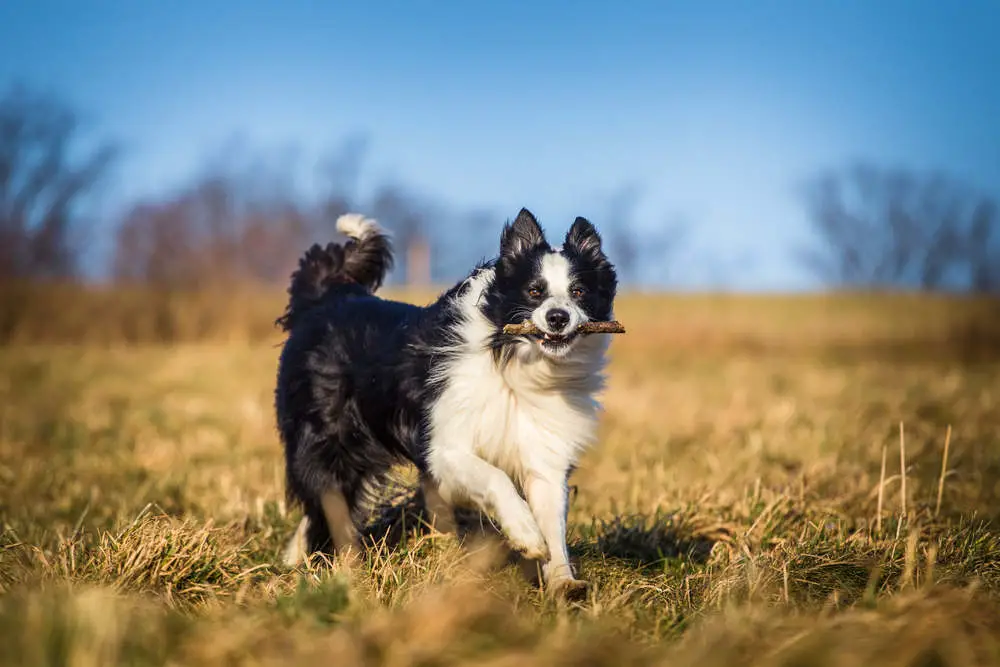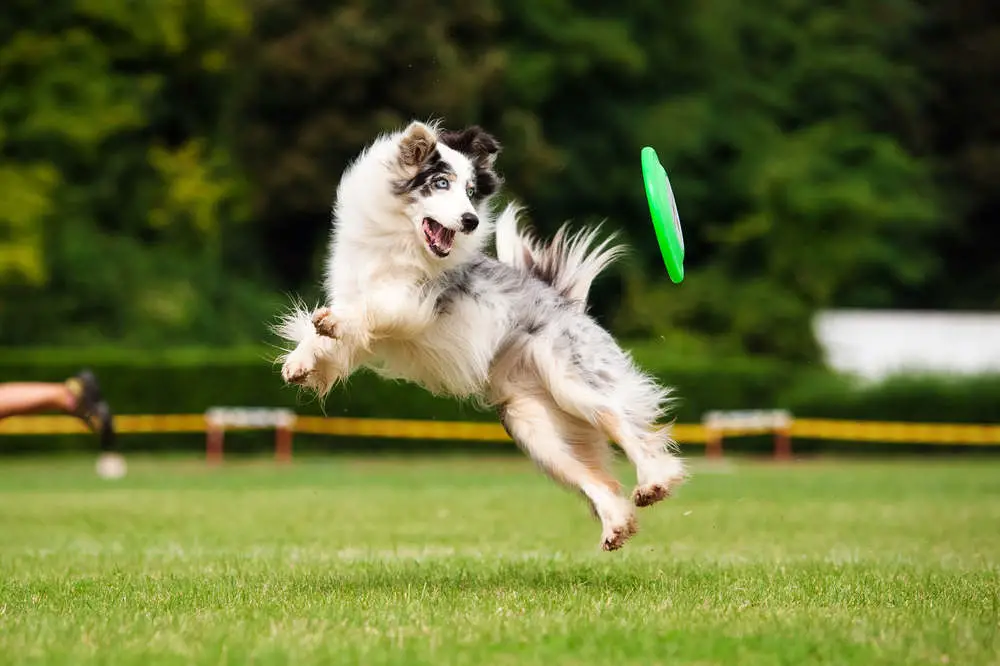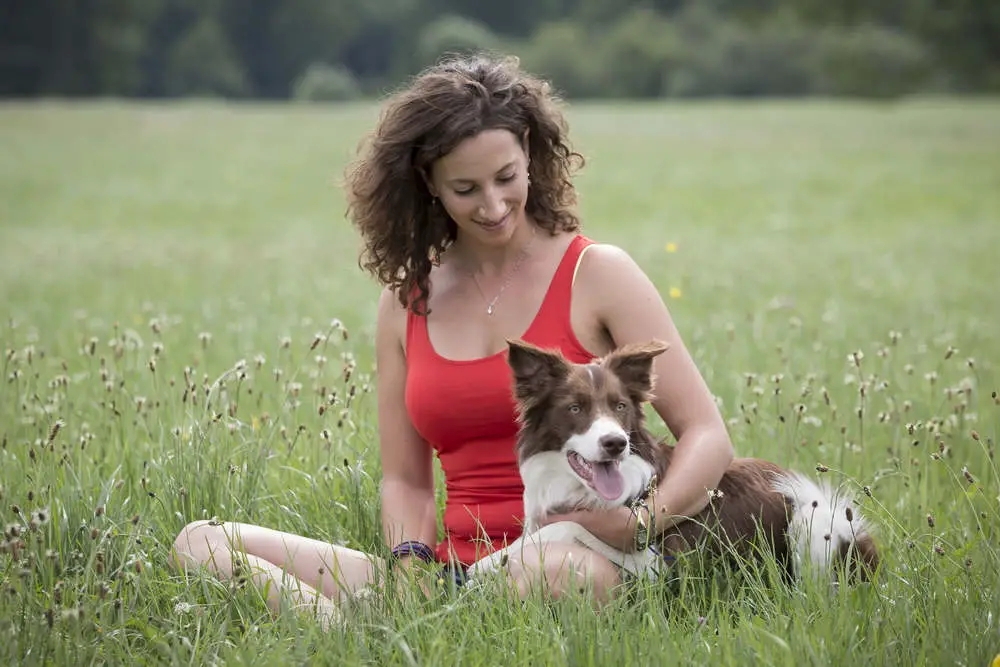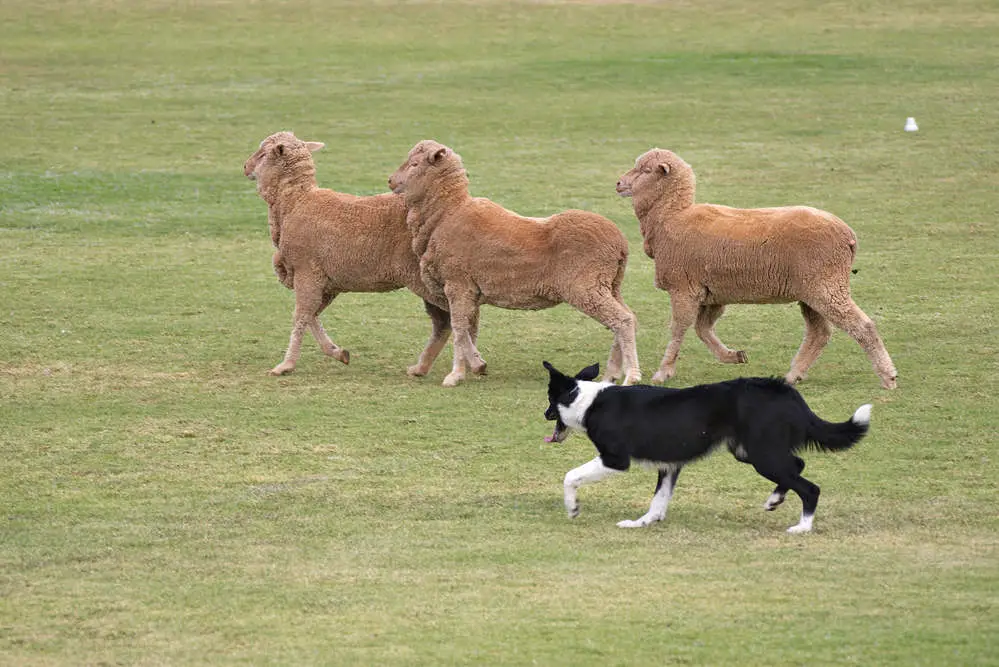
A very intelligent and athletic dog that has an agile and strong body is what you get when you opt for a Border Collie. This dog is medium-sized and is popular for its strong instincts and alertness.
If you like checking out animal videos on social media, you might have seen Border Collies taking care of other animals like ducks because they were originally bred for herding purposes and they are excellent at this job.
Border Collie: At a Glance
- Height:
- Males: 22 inches
- Females: 20 inches
- Weight:
- Males: 30 to 45 pounds
- Females: 30 to 42 pounds
- Appearance: One or two or three colored coats, black coat with or without white, white and red, merle or sable coat
- Temperament: Intelligent, responsive, loyal and energetic
- Lifespan: 12 to 15 years
- Most Suitable For: Active households where they will get a good deal of exercise
Origin of the Breed
The Border Collie is a herding dog that is a descendant of the sheepdogs from the British Isles in the 1700s. It was developed on the Scottish-English border, which is where it gets its name from.
The dog is said to be a descendent of other collies like the Scotch Collie or the Bearded Collie or Beardie. But some also say there might be a Spaniel mixed in there somewhere.
Back in the day, that’s the 1800s during Queen Victoria’s era, this breed became very popular as a sheep-herder. It gained a reputation as a hardworking and diligent dog as it is even today.
Related: Border Collie Pomeranian Mix Breed Profile
By the 19th century, Border Collies became a popular breed among the English gentry. And since they are smart dogs, they were used for police narcotics work, search and rescue missions and helping bomb squads etc.
The Border Collie is also a very intelligent dog that made its way to New Zealand and Australia only in the last century. They got it to help take care of the cattle at the sheep ranches.
Now, we say sheep herders, but Border Collies are pretty good with any kind of herd. This includes handling other pets and children too which is why they are a good fit for families.
These dogs are also wonderful companions in a home because they get along so well with human beings. But you should make sure that you can keep up with the amount of exercise these sheep-herders need.
These dogs are also good guide dogs (as you can glean from their ability to herd cattle) and that’s why they are also used to help the blind.
Despite its many incredible qualities, the American Kennel Club recognized the breed only in 1995.
Related: Can Border Collies Live Outside?
Border Collie Temperament and Behavior

Border Collies are loyal and alert dogs. And when they have a job to do, they are very happy.
Of course, you can keep them joyful even by playing with them. Essentially, physical activity is their thing and that keeps their spirits high.
You can try and cuddle them in the middle of a work day, but they will give in only when they are done with the task at hand.
Now, they are also good guard dogs which means any visitor you have won’t go unnoticed. They are also very sensitive to sounds which keeps them in the know of any movement in their vicinity.
But as a result, thunder and fireworks make life miserable for them as they do for most dogs because their sense of hearing is a lot sharper than humans.
Related: Can Border Collies Be Service Dogs?
Caring for a Border Collie
One thing about a Border Collie is that they don’t like to be alone. So, it’s not enough that you have a lot of space where they can walk and jump around.
You have to give them something to do which will keep them occupied. If you don’t do that, Border Collies develop bad habits like chewing furniture, digging dirt, chasing cars and barking idly.
But the fun part is since they’re herder dogs, they might nip and nudge at their humans and pets too, which can be fun. If you have other pets, you want to handle this situation right away so that all your different animals don’t butt heads.
But there’s more to caring for a Border Collie. Let’s take a look at each category in detail.
Related: Do Border Collies Smell?
Diet and Nutrition
Border Collies are very active dogs which means they need good and high-quality food. You can buy commercial kibble or make it at home after talking to your vet.
You want to create a schedule for their diet and while you are doing so, you should take their age into account. For instance, you want to adjust the food based on whether you have a puppy and adult dog or a senior.
If you are watching your dog’s weight, you should take its current weight and calorie intake into account. You must also think about the treats you give your dog during training so that you don’t accidentally trigger behaviors that might lead to obesity.
Related: Are Border Collies Picky Eaters?
Border Collies typically need three-quarters to a full cup of dry dog food twice a day. This, of course, varies based on your dog’s age, size and level of physical activity.
And don’t forget to keep fresh and clean water available to your pup all the time. This schedule won’t stay the same forever because the food needs of a Border Collie change during their lifespan.
So, always keep an eye on their weight and talk to your vet about what to do to keep it under control. You will also need the quantity and type of food over time.
And since it’s an energetic dog, keep the exercise levels high.
Possible Health Issues

Border Collies look a little like the Australian Shepherd but lighter. And instead of a bobtail, they have a tail that is feathered.
It’s also a tall dog with a long body and a head typical of a collie. Now, just because this dog likes to be active, it doesn’t mean it doesn’t have health issues.
So, you should know a thing or two about the most possible health problems in this breed. We’d recommend that you adopt, don’t shop as they say, but if you care about getting it from a breeder, you want to make sure that they have checked the dog for the following health issues:
- Hip dysplasia
- Epilepsy
- Deafness
- Collie eye anomaly
- Progressive retinal atrophy
- Trapped neutrophil syndrome
- Neuronal ceroid lipofuscinosis
Good breeders strive to do this so as to meet the standards set by clouds like the American Kennel Club. When they do so, pups are not as likely to inherit the above-mentioned health issues.
You should also brush your Border Collie’s teeth regularly and check their ears for possible infections.
Hip Dysplasia
Hip dysplasia is a common problem among Border collies. This is a condition where the ball in their hips does not fit into the hip joint’s socket as it should.
As a result, there is friction between the two bones and it causes both pain and inflammation. The latter can even lead to arthritis at a later stage.
You can detect this problem early on by doing a full orthopedic exam. You can also conduct hip radiographs, but the canine must be sedated for this.
Dog parents can also understand the condition better by opting for PennHIP and OFA radiographs. This kind of early detection can also be useful in correcting the situation through surgery.
Sometimes the procedure is simple, and if it is serious, your pup could need a replacement. If it’s not an advanced case, sometimes supplements and medications can also help your dog’s discomfort and mobility problems.
Epilepsy
This seizure disorder is another common problem Border Collies are predisposed to and usually you will start seeing signs when they are 2 to 5 years old. But it can be controlled by giving them anti-seizure meds.
Collie Eye Anomaly
This is a dangerous genetic problem that can cause anything from simple eye problems all the way to blindness. They have it from birth but you’ll see signs by the time they are 5-6 weeks old.
You can detect it with genetic testing, but there aren’t many solutions. If your breeder is responsible, they will test for this and take action to keep the dogs healthy.
Progressive Retinal Atrophy (PRA)
This is another degenerative eye condition which can reduce vision to the point of blindness. You will see signs by the time your dog is three, but you can test earlier than that to find out.
There are ways to manage the disorder, but there’s no treatment. Luckily, these dogs are intelligent enough to navigate even while they’re losing their vision.
But you must make sure the environment around them is safe, too, with safety gates, short leashes and such.
Trapped Neutrophil Syndrome (TNS)
This is exclusively a Border Collie problem that occurs because of a gene mutation. As a result, their immune system is compromised and it leads to chronic infections.
This problem exists from birth and it will lead to developmental problems, including being smaller in size than a Border Collie without this condition. TNS is a fatal disease and there is no cure.
So, unfortunately, dogs with this problem live only for about a few months. But the quality of life can be improved and life expectancy can be increased with meds and treatment.
You can also diagnose this condition early on with genetic testing so that pups with this gene are not bred further.
Related: When Do Border Collies Stop Growing?
Neuronal Ceroid Lipofuscinosis (CL)
This is another health condition that is the result of a genetic mutation. It causes problems like blindness, seizures and changes in personality.
You will see the symptoms emerge around the time the pups are 15 to 20 months old and this will reduce their lifespan drastically.
Genetic testing can help breeders discover this condition early on.
Training
Border Collies are smart dogs and they can learn new tricks quickly and easily. So, you don’t have to work too hard training these dogs.
If you have other pets or children in the house, you want to make sure socialization is done early on. This will build a positive attitude in the dog towards your family.
It is recommended that you expose the dog to various situations and people in the first seven months. It is not unusual to keep Border Collies in obedience training for a long time because it teaches them things, stimulates their mind and keeps them happy.
Related: Are Border Collies Good With Cats?
Exercise
As mentioned earlier, this is an athletic dog with an appetite for work. So, if you get them, you need to do more than walking around the block once a day.
This dog needs your time and some space for physical activity. So, if you are not putting the dog to work, you have to find time and play physically engaging games.
They are also herding dogs which means they are good at flyball, flying disc and Frisbee style of games. You can also take them for tracking or other sporting events and see what they’re made of.
If you can’t do much of that stuff, you should aim for two long and brisk walks that come up to two hours per day. And don’t forget to keep them on a leash unless you want your pup chasing traffic.
Related: Do Border Collies Like to Swim?
Grooming
These dogs have two types of coats. One of them is feathered, sleek and medium-length (that’s three inches) and the other is short and coarse about one inch long.
If it’s the latter, it might have a soft undercoat which should be groomed on a regular basis.
Both of them are double coats and are weather-resistant. You will find them in many colors like white and black, white and red, gray and black, completely black or in three colors.
Whichever type of coat your Border Collie has, you must brush it 1-2 times a week. Sometimes you will have to do more than that.
For instance, you will have to do it more often when it is shedding season. This will keep the coat free from debris, dirt, tangles and mats.
As is the case with most dogs, you must trim a Border Collie’s nails regularly, too even though most of them will be worn down. It’s important to do this so that the dog is comfortable and healthy.
And they must be given a bath once every three months. And their teeth must be brushed 2-3 times a week.
So Should You Get a Border Collie?

Now, here’s what you need to know. More often than not, there is no such thing as a good or bad breed.
You just need to make sure that the breed matches your requirements and lifestyle. The same is true for Border Collies too.
Pros
- Hardworking and loyal dogs
- Agile and very good at dog sports
- Perceptive and hence easy to train
Cons
- Not very well behaved if they don’t get enough exercise
- Cannot be left alone, especially without a task
- Not a good companion if you don’t have lots of space where they can spend their energy.
- Not the best with children or other pets unless socialized
Related: Can a Border Collie Live in an Apartment?
Parting Words
Border Collies are rather wonderful dogs with a great level of loyalty and diligence. Give them a task and they will execute it perfectly.
They are great guardians and herding dogs. But if you have little children and don’t socialize the dogs at an early age, you will run into trouble.
